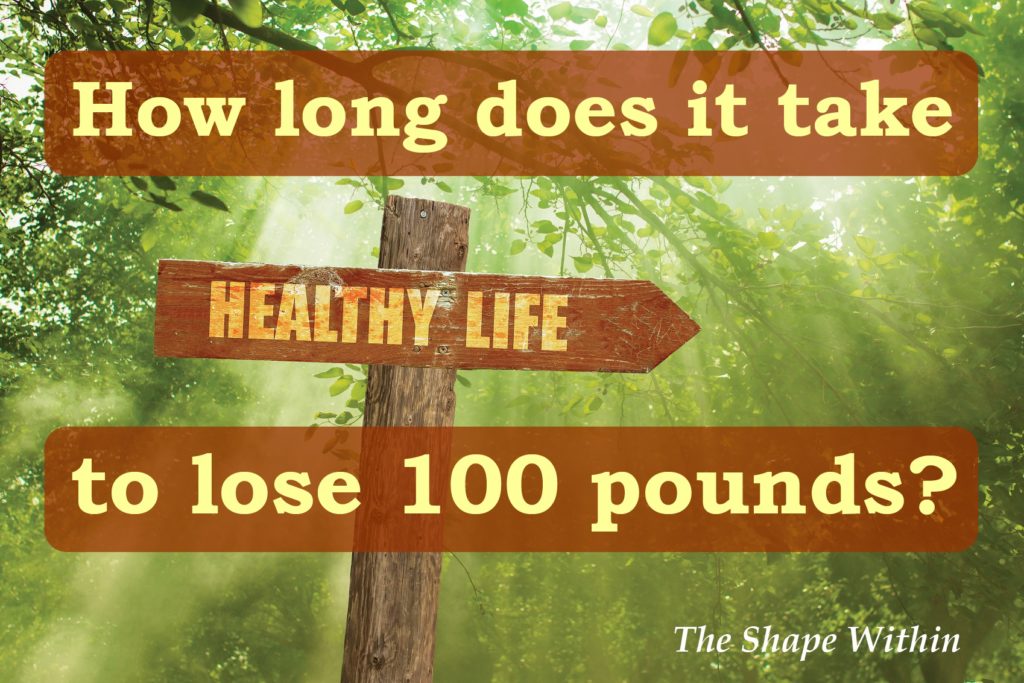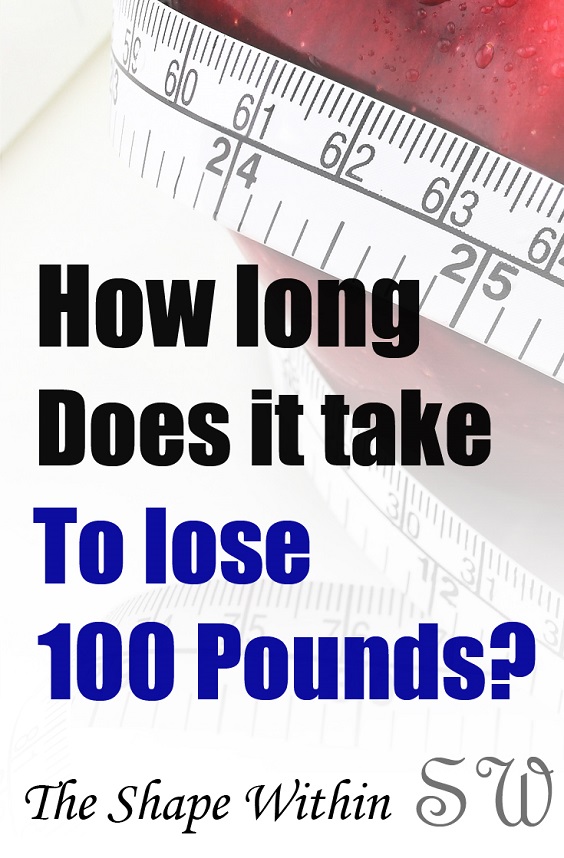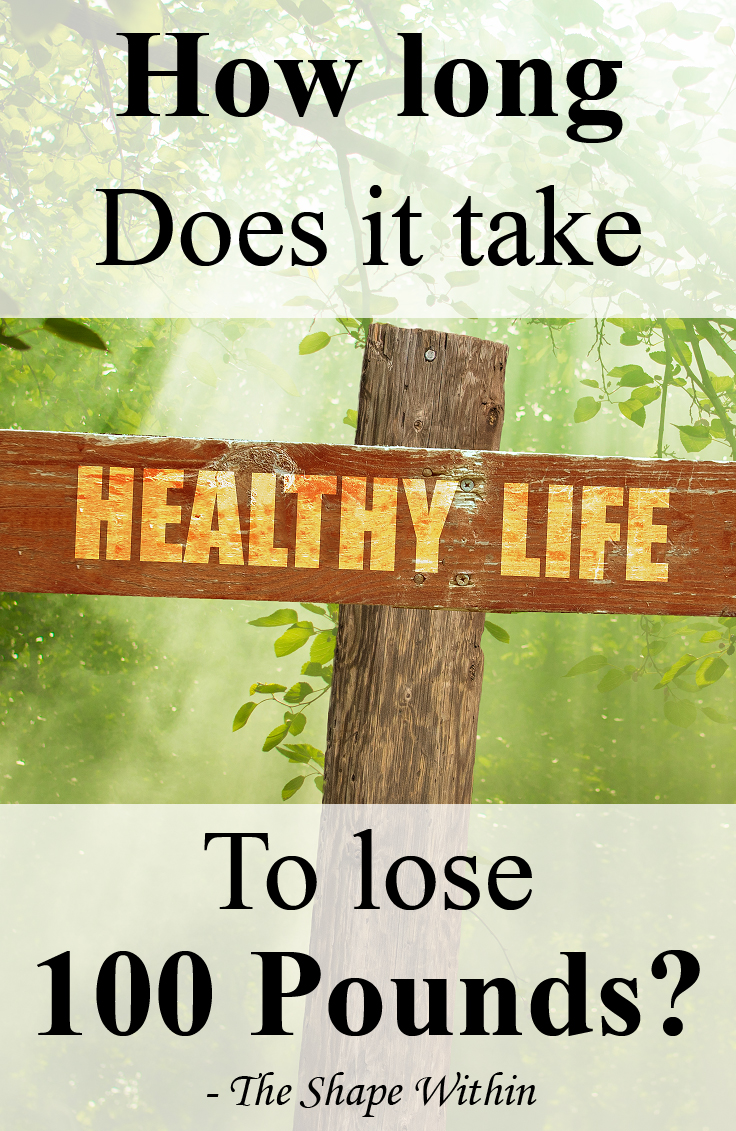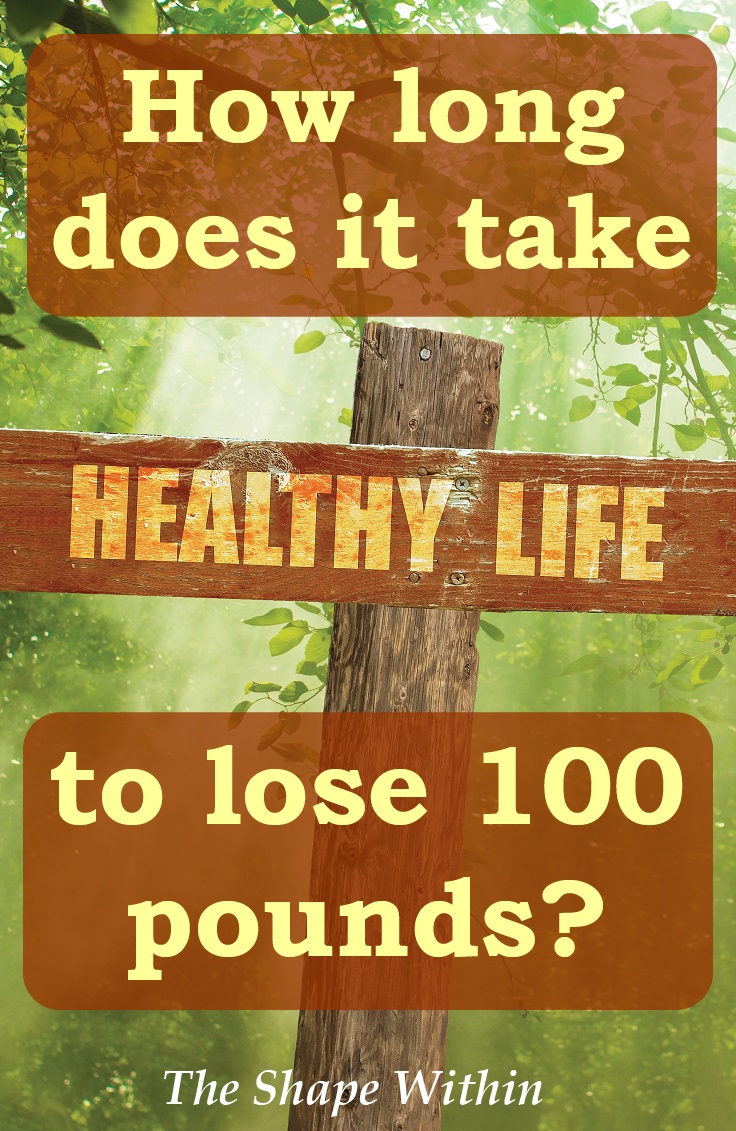How Long Does It Take to Lose 100 Pounds

Losing 100 pounds is a big endeavor, but lots of people do it all of the time and you can too!
But the number 100 can seem extremely difficult to reach, especially if you have never experienced any significant success in your weight loss efforts before.
How long it takes to lose 100 pounds is of course dependent on a few different factors, such as your current weight, how hard you are working, and whether you are both dieting and exercising… but in general it takes about a year to lose 100 pounds.
There I said it. Some of you may be thinking that 1 year sounds like just as big of a number as 100 pounds, but let's break it down into something that you can actually look forward to rather than dreading.
So why I am telling you that you can lose 100 pounds in a year when I lost 80 pounds in the same amount of time?
Simply put, I didn't have 100 pounds to lose, but for those who have 100 pounds or more to lose, 1 year is a perfect amount of time to hold in mind for your goals.
So how do we break up such a seemingly large task into something that is not only manageable, but also enjoyable?
I'm going to show you not just how long it take to lose 100 pounds, but also how to actually achieve it with healthy food and exercise, from getting started to staying on track!
But before we break down how to do it, let's break down how small changes add up to HUGE results.
How long does it take to lose 100 pounds?
So how long will it take to lose 100 pounds? Let's break it down in 3 different ways… all of which lead to the same answer.
Simple breakdown: Pounds per week
There are 52 weeks per year.
this means that if you lost 2 pounds per week for 1 year, you could lose 104 pounds (2 x 52 = 104)
2 pounds per week may not sound like a lot at first… but as you can see it adds up to more than 100 pounds in one year.
You may have weeks that you lose more… and some of you may know that you can dedicate to losing weight even faster than this… but I would suggest setting attainable goals.
Losing 2 pounds per week on average leaves room for enjoyment, gradual improvement, and also error which should be expected.
Breakdown by calories:
Although you don't actually have to count calories to lose weight, since eating healthier foods will naturally put you in a calorie deficit… here is how losing 100 pounds breaks down with concern to calories, just for reference.
Since there are 3,500 calories in one pound of fat… at the rate of 2 pounds of fat loss per week this amounts to creating a calorie deficit of 7,000 calories on a weekly basis (3,500 x 2 = 7,000)
Since there are 7 days in a week, this means that your body will need to burn about 1,000 calories more than you consume every day. This may sound like a lot, but by eating healthy foods and exercising you will be burning more calories, and consuming less, which will both go towards creating a bigger calorie deficit.
If you are overweight and your diet is currently quite unhealthy, then your current daily calorie intake is probably well above 2,000… and this means there is tons of room for improvement and it will be easy to cut lots of empty calories out of your diet.
By simply replacing one super unhealthy meal/snack with healthy one, you can avoid eating nearly 1,000 unneeded calories… while still getting more useful nutrients (i.e. hunger-free weight loss).
A fast food meal… or a large milkshake… or a huge soda… any one of these things can add up to 1,000 calories, and can be replaced with something much healthier, such as a meal of brown rice, broccoli, and chicken breast amounting to 200 calories. That's a reduction of 800 calories just by making one healthy meal trade!
Just remember that when you cut something out of your diet, it needs to be replaced by something healthy or you'll get hungry.
Then exercise also comes into the equation, further helping you burn more calories than you consume.
Lot's of people will only calculate the calories that they burn during a workout. However, your metabolism will actually continue to be elevated even after your workout is done, especially if you make you exercise routine intense, or if you lift weights.
High-intensity workouts and resistance training have both been proven to invoke an "after-burn" effect where your resting energy expenditure is elevated for a period of up to 48 hours.
This means burning more calories throughout the day even when you are resting. So this is just another reason why reaching that goal of burning 1,000 calories per day is easier than you may have thought.
But I cannot stress enough that I only mention calories to show that it is very possible to lose 100 pounds in 52 weeks (1 year). To lose weight by eating healthy all you need to do is focus on ADDING healthy foods into your diet.
Healthy, natural foods will replace the unhealthy foods in your diet and reduce your daily calorie consumption without having to experience the stress of a restrictive mentality, or worse starving.
This is exactly how I was able to completely transform my diet and lose 80 pounds without ever needing to feel hungry or count calories… by simply eating MORE healthy food.
Focus on consistently improving your diet and exercising more as time passes, and you will notice that your body is constantly transforming.
What if you have over 100 pounds to lose?
But if you have more than 100 pounds to lose, and are both eating healthy and exercising… then you will be able to lose 100 pounds even faster than one year.
The more that you currently weigh, the more weight you will be able to lose each week, especially towards the beginning of your journey.
When examining someone's weight loss results and how long it took them to reach their goal, you have to consider what their starting weight was.
There is a big difference in the rate of weight loss between someone who weighs 300 pounds and wants to lose 100 pounds, and someone with the same goal in mind who currently weighs 400 pounds.
People who lose multiple hundreds of pounds, lose their first 100 pounds in a staggering amount of time, possibly 6 to 8 months (3 pounds per week average) if they are working hard enough.
Detailed breakdown: 4% weight lost per month
Here is a table that shows how much you could weigh each month for up to a year, if you lost 4 percent of your weight every month.
Percentage is a great way to calculate goals, as it naturally adjusts for varying sizes of people, as well as the difference in expected fat loss between the beginning of your journey, and as you approach your goal.
By the numbers in this table you'll see that more weight is lost in the beginning months, and more is lost for those who have a higher starting weight, as should be expected in real life, and such is beautifully represented by using percentage to calculate your goals.

Let's take two example from this table to see how the monthly weight loss results add up over time for people of two different sizes.
First let's consider the person with the starting weight of 300 pounds (as shown on the 4th row down).
As you can see, from the table, the person who begins at 300 pounds, and loses 4% of their body weight in the first month, will lose 12 pounds in their first month (0.04 x 300 = 12), leaving them at about 288 pounds. This amounts to about 3 pounds lost per week in the first month.
Now let's look at the same person, and how much weight they would lose half-way through their journey, while still losing 4% of their body weight per month.
This time, the person who was originally 300 pounds, weighs 235 pounds at the half-year mark. In the following month this person would lose about 10 pounds (0.04 x 235 = 9.4), leaving them at about 225 pounds.
You may notice that in this particular case, if this person continued to lose 4% of their body weight per month until they had lost 100 pounds, it would take this person about 10 months to successfully reach their 100 pounds goal!
This shows how you can expect you lose more weight at the beginning of your journey, and lose a bit less weight as you are nearing your goal weight.
Now let's consider the same math for someone who weighs 400 pounds (as shown by the last row of the table).
The person who begins at 400 pounds, and loses 4% of their body weight in the first month, will lose 16 pounds in their first month (0.04 x 400 = 16), leaving them at about 384 pounds. This amounts to about 3 pounds lost per week in the first month.
Now let's look at the same person, and how much weight they would lose half-way through their journey, while still losing 4% of their body weight per month.
This time, the person who was originally 400 pounds, weighs 313 pounds at the half-year mark. In the following month this person would lose about 10 pounds (0.04 x 313 = 12.52), leaving them at about 301 pounds.
In this case, the person who originally weighed 400 pounds, lost 100 pounds in 7 months. This is 3 months faster than the person whose starting weight was 300 pounds.
This example, when compared with the example above, shows both how you will lose weight faster at the beginning of your journey, and how people who weigh more currently can expect a higher rate of fat loss.
If you want to track your weight and calculate your goals for up to a year, here is a weight loss tracker/calculator that you can use to keep track of your monthly weights, and to automatically calculate your goals!
How to lose 100 pounds in a year
 Now that we've broken down how long it will take, let's get into how to actually achieve your dream of losing 100 pounds or more.
Now that we've broken down how long it will take, let's get into how to actually achieve your dream of losing 100 pounds or more.
If you are just about to start your weight loss journey, saying that it will take you a year to get there may sound really difficult.
But don't think of it as a yearlong task that will be daunting, think of it as gradually starting to live a healthier lifestyle that will stick with you forever.
Once you get your routine going, start finding healthy foods that you love, and especially start seeing your results add up, you won't be worried so much about how long it takes to lose 100 pounds, because you'll know that you are going to make it the whole way no matter how fast you go.
There will be many milestones along the way. You will experience many different levels of looking better, and feeling better about yourself.
It is not as though you will have to wait until you reach your end goal to start feeling all of the awesome benefits of getting in shape, with losing 100 pounds or more your life will change for the better many times over.
Focus on losing the first 5 pounds, and then 20, then 50, and then strive for the 100 mark! Each of these milestones offers it's own exciting rewards.
Make changes that you can consistently stick with, and always focus on eating more healthy food rather than simply eating less.
To lose 100 pounds, you simply need to get started with eating healthy and exercising consistently, but at a pace that you can comfortably maintain until you are ready to step up your results and efforts.
Eat more healthy foods every day
So many times I hear someone say that they simply ate less, went to bed hungry, and felt like losing weight was too hard even for one day… And I can never seem to stress enough, that not only is this not necessary, it isn't nearly as effective in terms of fat loss as filling up on highly-nutritious, healthy foods.
We so often think that the hungrier we are, the more weight we are losing, but this is not true.
Eating more healthy food will give your body the nutrients and fulfillment it needs while allowing you to remain in a calorie deficit, and burn your own store of fat at a high rate.
Good food replaces unhealthy junk food by stopping cravings before they come, and by literally replacing the space in your stomach that was originally destined to be filled with something unhealthy.
Whenever I want to ramp up my results, I don't cut back, I simply focus on eating MORE healthy foods.
The foods that will help you lose weight
So what types of foods should you eat to lose lots of weight?
The best foods to help you lose 100 pounds are foods that are unprocessed, unmodified, and still basically as they were when they were harvested from nature.
Many people call these "real foods", but they are more commonly known as, "whole foods".
Whole foods can be broken down into the following categories, each of which contains an incredibly wide variety of healthy options for weight loss:
Vegetables
Vegetables are amazing weight loss foods, perhaps the very best because they are so incredibly low in calories and incredibly high in nutrients.
The more vegetables you eat, the more weight you will lose, as they will replace lots of other unhealthy food that is high in calories.
Leafy green and cruciferous vegetables are particularly healthy (such as broccoli, cauliflower, kale, lettuce)… but it is best to eat a wide variety of vegetables, such as peppers, cucumber, tomato, and other mixed veggies.
Sweet potatoes are also a vegetable, although they are considered a starchy vegetable and not quite as low-calorie / nutritious as the other vegetables, is still a great food for weight loss.
Normal white potatoes are also a nutritious vegetable, but are unique in that they digest very fast, so choosing sweet potatoes is a better choice.
Fruit
It's hard to believe how good fruits are for weight loss simply because of how sweet they are, but they truly are an amazing option for keeping your daily calorie count low and therefore for burning fat.
Although they are not as low in calories as vegetables are, they are still very low in calories compared to unhealthy, processed, packaged foods. On that note… no other foods compare to vegetables, but you still need balance in your diet.
Apples are one of the best fruits to choose if you like them… because they are high in fiber, only have 50-100 calories, and they last a long time before they go bad.
But choose the fruits that you like so that you can eat them consistently!
Whole Grains / Beans
Whole grains such as brown rice and oats (non-instant / old-fashioned), as well as beans and legumes (like black beans), are also great natural foods for fat loss.
Brown rice, in comparison to white rice… digests slowly and contains valuable fiber and protein in it's outer bran layer, which is what causes it to give long-lasting energy. White rice however has been stripped of this layer that contains the important nutrients, which causes it to digest quickly and to be stored quickly as fat.
Brown rice goes great with lots of foods, and is a popular choice to for a go-to weight loss meal when combined with boiled or baked chicken.
Seeds / nuts
Nuts and seeds cover most of the healthy fats, which are higher in calories than the other whole foods but are very nutritious and unlike unhealthy sources of fat, promote the loss of body fat when consumed in moderation and especially when used as a replacement for another unhealthy food.
Plain, unsalted, dry-roasted nuts like almonds and peanuts are great options, and as far as seeds go great options are chia, flax, pumpkin, and hemp seed.
Quinoa is another popular seed that people eat for weight loss, although it is usually treated and prepared like a grain.
Unprocessed meat (lean meat)
Meat is also a whole food, and is a very important part of a healthy diet because of the high amount of protein that it contains.
Eating lots of protein is important for satisfying your hunger completely before overeating, as without enough protein you will continue to be hungry even when you eat a large amount of food.
With meat it is important to choose unprocessed, non-ground meats that are very lean.
White meat like chicken and turkey are great, lean options… and fish like salmon is an even better option as the fat that it contains is healthy unsaturated fat (unlike most meats that have saturated fat).
Eggs fall into the category of "meat" as well.
So take some time to recreate your shopping list! Add some healthy foods to it, and cross off a few unhealthy ones too, and start eating more and more healthy foods every day (but don't try to do everything all at once, take it in steps).
Once you are comfortable with continually improving your diet, add exercise into the mix so that you burn fat faster, and so that your body stays strong and nicely shaped as you get thinner.
Strive to exercise 3 times per week
Exercise is also very important for reaching your 100-pound weight loss goal.
You may be excited to hear that you can burn lots of fat and get a truly significant result from simply exercising 3 times per week for about 15 to 20 minutes.
Any increase in physical activity will help you burn more calories, but in particular if you get a good hard workout a few times per week then you'll greatly increase the amount of weight that you are losing.
What's most important is to choose the type of exercise that best suits your body type, and your personality/preferences.
If you like to go for walks then go for walks!
If you like cycling and cardio exercises, then those are the type of activities that will inspire you to exercise consistently.
Lifting weights is also an amazing way to burn fat, is very enjoyable, and is particularly good for obese people as it can be done without having to strain your legs and does not require exhausting cardio to be extremely effective.
Just as with healthy eating, the key to getting great results over time with exercise is dedicating to consistency, and not worrying if your routine is far less than perfect. You can undergo an amazing transformation by being far less than perfect… take it from me!
Will it help to combine diet AND exercise?
Dedicating to both eating healthy every day and exercising consistently a few times every week is essential if you want to reach your weight loss goal quickly and as easily as possible.
You may think that doing both of these things at the same time would just make your journey harder, but combining healthy diet and exercise actually allows you to experience the fastest and best results that you can, and makes your journey much easier.
I have personally experienced how effective this combination of eating healthy AND exercising is, having lost weight with diet alone, exercise alone, and both together.
Research also shows… that although eating a healthy low-calorie diet and exercising are each effective methods for weight loss when used as "stand-alone interventions", the most effective results observed came from study groups who both dieted and exercised.
If you want to read more about how powerful the combination of healthy diet and exercise can be, and see the research that supports this, read, "Diet vs Exercise for Weight Loss (vs Both)".
The amazing impact of losing 100 pounds
 Here's the fun part…envisioning what it would actually be like to weigh 100 pounds less. What would that mean for you?
Here's the fun part…envisioning what it would actually be like to weigh 100 pounds less. What would that mean for you?
Does it mean being able to get up and down easily, being able to enjoy a theme park, being able to keep up with your kids or friends, or perhaps just less pain and feeling like a whole new person?
The more weight we have to lose the more we struggle, but your transformation will be that much more exciting and life changing.
Losing 100 pounds doesn't just mean looking better and having a little more energy, it means a whole new life!
The more you have to lose in weight, the more you have to gain in life, so be excited about starting your new journey! Take it slow and focus on making lifestyle changes, and before you know it you will see a whole new person in the mirror.
To start changing your habits and losing 100 pounds one step at a time, the healthy way… try the 8-week weight loss challenge! There are diet plans and exercise plans that gradually build over time, so that you can start seeing results right away but also be confident that you can stick with the changes. Sign up below for your free training or read more about the coursehere!
If you want to learn everything you need to know about losing 100 pounds, read my ultimate guide on how to lose 100 pounds!

How Long Does It Take to Lose 100 Pounds
Source: https://www.theshapewithin.com/how-long-does-it-take-to-lose-100-pounds/